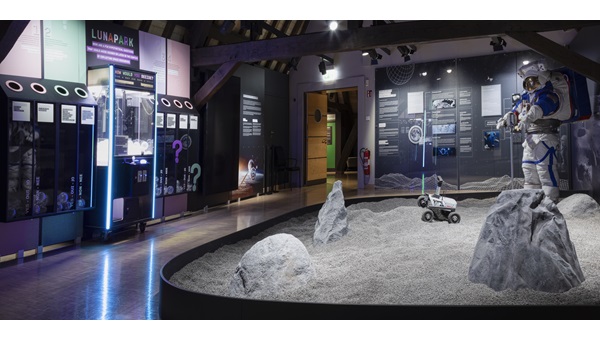 Credit: Eric Threinen
Credit: Eric Threinen
Asteroid Mission has announced it recently put on a temporary exhibition curated by Eric Buttini, complete with workshops and events, both at the Naturmusee, Luxembourg's National Natural History Museum, and in other locations both in Luxembourg and nearby.
Asteroids have been impacting Earth for millennia, and even today, remnants from the early solar system continue to populate our celestial neighbourhood. The Earth bears evidence of this in the form of nearly 200 identified impact structures. The Vredefort crater, for instance, is the largest known meteorite impact crater on Earth, with an estimated diameter of around 300 km. It was formed around 2 billion years ago when a giant meteorite crashed into Earth at an estimated speed of 20 km/s, creating an explosion that released energy equivalent to several billion times that of the Hiroshima atomic bomb.
This exhibition aims to give answers to questions such as:
- when the next object from the solar system might hit Earth;
- how many near-Earth asteroids there are;
- how potentially dangerous asteroids are detected;
- how we can protect ourselves from a dangerous asteroid that will highly likely be discovered in the future.
The exhibition "Asteroid Missions" presents the history of the solar system, the formation and development of asteroids, space resources and the question of ownership thereof, planetary defence and technological challenges to be mastered concerning an eventual future life beyond Earth. Asteroid Missions is currently on display on the second floor of the National Museum of Natural History in Luxembourg until 18 August 2024.
The exhibition is complemented by a programme of several conferences, workshops, discussions and interactive theme nights. Those available in English are, notably:
- Observation of the night sky with the naked eye and telescopes with the association of Amateur Astronomers of Luxembourg, (Astronomes Amateurs Luxembourg - AAL) in Bissen (details after registration) on Saturday 2 December 2023 from 20:00, only in case of favourable weather (Free);
- Sunday Guided Tours on Sunday 10 December 2023 and 21 January 2024 from 15:00-16:00 (5€);
- Tuesday-Express Tours on 30 January 2023 from 17:30 to 18:05 (Free);
- Meet and discuss with Dennis Harries from the European Space Resources Innovation Center, about the Hayabusa 2 mission that brought samples of the asteroid Ryugu to Earth in 2020 and his passion as a meteorite hunter, on Saturday 9 December 2023 between 15:00-17:00 (€5);
- Space Quiz by Jérôme Decker about the evolution of asteroids and the solar system, space resources and the defence of Earth from asteroid impacts on Tuesday 12 December 2023 from 18:00 to 20:00 (Free);
- Observation of Géménides shooting stars and other space objects with the association of Amateur Astronomers of Luxembourg, (Astronomes Amateurs Luxembourg - AAL) in Bissen on Friday 15 December 2023 (details after registration) from 20:00 only in case of favourable weather (Free);
- Constellation LED creation run by Lycée Vauban students at M20 Makerspace on Sunday 17 December 2023 from 14:30 to 17:30 (€10);
- Observation of the night sky with the association of Amateur Astronomers of Luxembourg, (Astronomes Amateurs Luxembourg - AAL) in Bissen on Saturday 9 January 2023 (details after registration) from 20:00 only in case of favourable weather (Free);
- Meet and chat with Manuel Huss from the European Space Resources Innovation Center, an amateur astro-photographer who defies light pollution every night with his breathtaking shots of star clusters, galaxies, planets and other nebulae, on Saturday 13 January 2023 between 15:00-17:00 (€5);
- Reading for Children between five and ten years old, from the book The Boy Whose Head Was Filled with Stars: A Life of Edwin Hubble by Isabelle Marinov and Deborah Marcero, on 20 January 2024 from 11:00 to 12:00 (Free);
- Constellation LED creation run by Lycée Vauban students at M20 Makerspace on 21 January 2024 from 14:00 to 17:00 (€10);
- LunaLab remote lunar exploration, where visitors can overcome one of the most difficult obstacles in telerobotics: lunar delay, on 28 January 2023 from 15:00 to 17:00 (€5).








